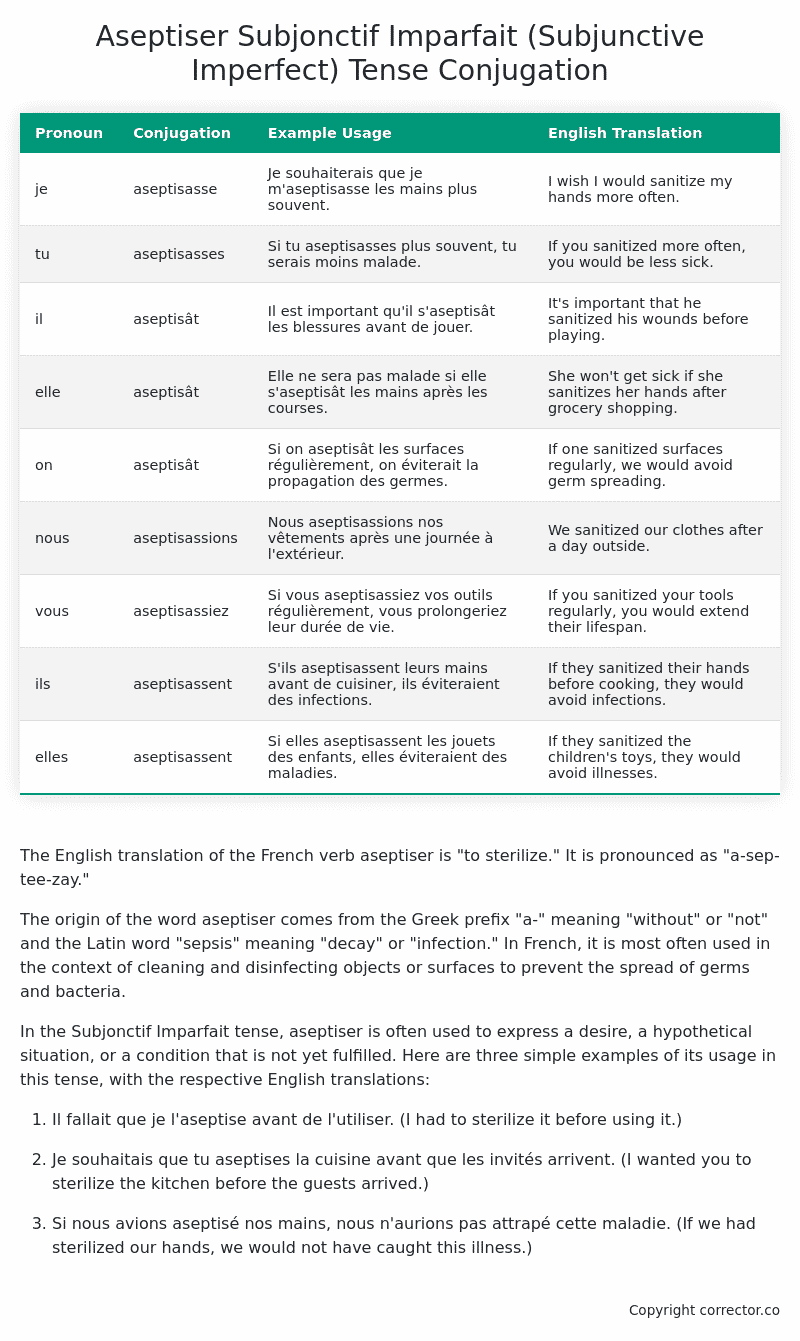Subjonctif Imparfait (Subjunctive Imperfect) Tense Conjugation of the French Verb aseptiser
Introduction to the verb aseptiser
The English translation of the French verb aseptiser is “to sterilize.” It is pronounced as “a-sep-tee-zay.”
The origin of the word aseptiser comes from the Greek prefix “a-” meaning “without” or “not” and the Latin word “sepsis” meaning “decay” or “infection.” In French, it is most often used in the context of cleaning and disinfecting objects or surfaces to prevent the spread of germs and bacteria.
In the Subjonctif Imparfait tense, aseptiser is often used to express a desire, a hypothetical situation, or a condition that is not yet fulfilled. Here are three simple examples of its usage in this tense, with the respective English translations:
-
Il fallait que je l’aseptise avant de l’utiliser. (I had to sterilize it before using it.)
-
Je souhaitais que tu aseptises la cuisine avant que les invités arrivent. (I wanted you to sterilize the kitchen before the guests arrived.)
-
Si nous avions aseptisé nos mains, nous n’aurions pas attrapé cette maladie. (If we had sterilized our hands, we would not have caught this illness.)
Table of the Subjonctif Imparfait (Subjunctive Imperfect) Tense Conjugation of aseptiser
| Pronoun | Conjugation | Example Usage | English Translation |
|---|---|---|---|
| je | aseptisasse | Je souhaiterais que je m’aseptisasse les mains plus souvent. | I wish I would sanitize my hands more often. |
| tu | aseptisasses | Si tu aseptisasses plus souvent, tu serais moins malade. | If you sanitized more often, you would be less sick. |
| il | aseptisât | Il est important qu’il s’aseptisât les blessures avant de jouer. | It’s important that he sanitized his wounds before playing. |
| elle | aseptisât | Elle ne sera pas malade si elle s’aseptisât les mains après les courses. | She won’t get sick if she sanitizes her hands after grocery shopping. |
| on | aseptisât | Si on aseptisât les surfaces régulièrement, on éviterait la propagation des germes. | If one sanitized surfaces regularly, we would avoid germ spreading. |
| nous | aseptisassions | Nous aseptisassions nos vêtements après une journée à l’extérieur. | We sanitized our clothes after a day outside. |
| vous | aseptisassiez | Si vous aseptisassiez vos outils régulièrement, vous prolongeriez leur durée de vie. | If you sanitized your tools regularly, you would extend their lifespan. |
| ils | aseptisassent | S’ils aseptisassent leurs mains avant de cuisiner, ils éviteraient des infections. | If they sanitized their hands before cooking, they would avoid infections. |
| elles | aseptisassent | Si elles aseptisassent les jouets des enfants, elles éviteraient des maladies. | If they sanitized the children’s toys, they would avoid illnesses. |
Other Conjugations for Aseptiser.
Le Present (Present Tense) Conjugation of the French Verb aseptiser
Imparfait (Imperfect) Tense Conjugation of the French Verb aseptiser
Passé Simple (Simple Past) Tense Conjugation of the French Verb aseptiser
Passé Composé (Present Perfect) Tense Conjugation of the French Verb aseptiser
Futur Simple (Simple Future) Tense Conjugation of the French Verb aseptiser
Futur Proche (Near Future) Tense Conjugation of the French Verb aseptiser
Plus-que-parfait (Pluperfect) Tense Conjugation of the French Verb aseptiser
Passé Antérieur (Past Anterior) Tense Conjugation of the French Verb aseptiser
Futur Antérieur (Future Anterior) Tense Conjugation of the French Verb aseptiser
Subjonctif Présent (Subjunctive Present) Tense Conjugation of the French Verb aseptiser
Subjonctif Passé (Subjunctive Past) Tense Conjugation of the French Verb aseptiser
Subjonctif Imparfait (Subjunctive Imperfect) Tense Conjugation of the French Verb aseptiser (this article)
Subjonctif Plus-que-parfait (Subjunctive Pluperfect) Tense Conjugation of the French Verb aseptiser
Conditionnel Présent (Conditional Present) Tense Conjugation of the French Verb aseptiser
Conditionnel Passé (Conditional Past) Tense Conjugation of the French Verb aseptiser
L’impératif Présent (Imperative Present) Tense Conjugation of the French Verb aseptiser
L’infinitif Présent (Infinitive Present) Tense Conjugation of the French Verb aseptiser
Struggling with French verbs or the language in general? Why not use our free French Grammar Checker – no registration required!
Get a FREE Download Study Sheet of this Conjugation 🔥
Simply right click the image below, click “save image” and get your free reference for the aseptiser Subjonctif Imparfait tense conjugation!

Aseptiser – About the French Subjonctif Imparfait (Subjunctive Imperfect) Tense
Formation
Common Everyday Usage Patterns
Interactions with Other Tenses
Subjonctif Présent
Indicatif Passé Composé
Conditional
Conditional Perfect
Summary
I hope you enjoyed this article on the verb aseptiser. Still in a learning mood? Check out another TOTALLY random French verb conjugation!


